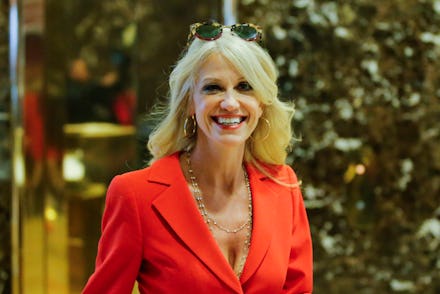Kellyanne Conway recounts experiences with sexism in her career

Kellyanne Conway has said in no uncertain terms that she rejects feminism: She thinks the movement spreads propaganda and portrays men as "feckless boobs."
But on Tuesday, the adviser to President Donald Trump opened up about her experiences with sexism as a young woman starting her career — the career that would eventually make her the first woman to ever manage a winning presidential campaign.
"I encountered all kinds of sexism," Conway said in an interview with Cosmopolitan. "The most extreme examples were unwanted sexual advances. Always by older men, often in positions of power, with some fancy title before their name and an 'R' or a 'D' after it."
Conway said there had been other more subtle sexist incidents during her time at the Polling Co., a consulting firm she launched in 1995.
"I'd get hired to do a project and would always get the focus groups," she said, adding that the male pollster on the job would get to "sit on his ass and watch some data come in" while she traveled the country living out of a suitcase.
"Eventually I learned just to take the whole project."
Conway told Cosmopolitan that she'd always kept her mouth shut about these incidents. She didn't want to be the "20-something or 30-something-year-old girl to try to make some federal case out of somebody who was in a huge position of power" — that would be embarrassing, Conway said.
During the 2016 presidential campaign, a dozen women came forward to accuse Conway's boss of making unwanted sexual advances or sexual assault. When they did, the were slapped with hashtags like #NextFakeTrumpVictim and accused of going public with their allegations at a time that felt a little too opportune.
Yet while Conway may have once found herself in a similar position as Trump's accusers; while about 1 in 3 women report having experienced sexual harassment in the workplace; while Conway is likely to find herself in many White House meetings over the next four years where she's the only woman — feminism, she maintains, is over. It's done its job.
"I consider myself a post-feminist," Conway told the Washington Post in January. "I consider myself one of those women who is a product of her choices, not a victim of her circumstances."